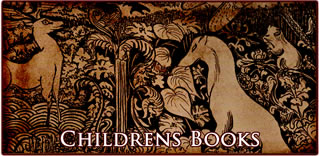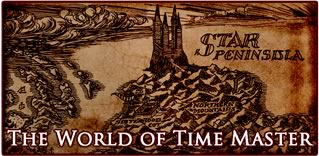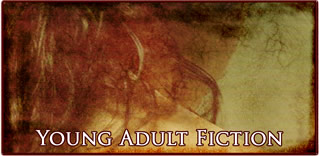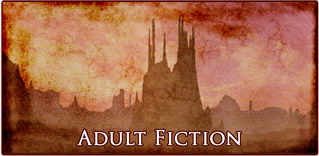HUNTER'S MOON
Published by Hodder Children's Books
ISBN 0-340-85400-6
£4.99
As she sprinted along the empty beach, Biddy knew it wouldn't be long before
Gil caught up with her. That was the worst thing about having an older sister.
Gil had longer legs and could run much faster; so whenever they raced — and
that wasn't often, because Gil hardly ever would — Biddy always lost.
This time, though, she was determined to outwit her sister, and when she saw
Gil jump the second of the groynes and come pounding after her she veered
inland towards the sand-dunes. The dunes were great; Biddy could lay a false
trail of footprints in the soft sand then hide behind a tussock of grass,
and when Gil started looking for her she'd jump out and give her the fright
of her life.
In her imagination
Biddy was riding a horse, and she snorted and whinnied—quite convincingly,
she thought—as she made her way among the dunes, looking for a good place
to hide. The wind had dropped and it was very quiet, and when she looked up she
realised that she must have run a long way along the beach. She looked around.
There was a belt of stunted and scrubby pine trees behind the dunes, then the
road, then more trees, and… something else.
Curious, Biddy
peered harder, and saw that beyond the second line of trees was an old church
with a wall around it. Something about it seemed wrong somehow, and that puzzled
her until, after a few moments, she realised what it was. The church was a ruin.
The roof had fallen in, the squat, square tower gaped open to the blue sky, and
what had once been a neatly-tended churchyard was now a thicket of brambles and
couch-grass. A few old, mossy gravestones poked up from the tangle here and there,
but the place had an air of desolation that drove all notions of horses and hiding
from Biddy's mind.
She walked
towards the road. She wouldn't cross over—she wasn't allowed to cross roads
on her own and it was one of the few orders she didn't argue with—but if
she went a bit further along on this side she'd get a much better view of the
ruin. Then, as the scrubby trees thinned out, she saw the second church.
It stood behind
the ruin, separated from it by a stone wall, and Biddy's eyes widened in astonishment
as she looked harder. The two churches were absolutely identical. The only difference
between them was that the second church still had its roof and tower intact,
and the churchyard wasn't a tangled wilderness but neat and tended and tidy. Weird, Biddy
thought. Where had Gil got to? She'd love this.
She turned
to call out to her sister and urge her to hurry up and see the strange thing
for herself. And came face to face with a boy.
Biddy yelped
in shock and almost fell over as she jumped back a pace. 'Where did you come
from?'
The boy was
a year or two older than her, and the most striking thing about him was the colour
of his hair. It was red—fiery red, sunset-red—and it was the first
time Biddy had ever encountered anyone with hair so like her own and Gil's. The
sisters suffered, as they saw it, from the same problem. At school they were
both saddled with the nickname of 'Carrots'. Biddy shrugged it off, but Gil hated
it. That was why she had begged Mum to let her have it cut so short. When she
got to be Gil's age, Biddy thought, she'd probably feel the same; and as no one
else in the family had hair like theirs it really didn't seem fair. But now she
was confronted by a complete stranger who was another Carrots, and despite the
start he'd given her, she felt a wave of fellow feeling.
She added,
'Sorry; I didn't mean to yell. You made me jump, that's all.'
The boy didn't
answer but only stood staring at her. He was very thin, she noticed, and very
pale, too. No freckles like she and Gil had, and his skin looked as if he spent
most of his time shut away from the light.
Trying again,
Biddy asked, 'Are you from the village? Naffam, or whatever it's called?'
'What if we
are?' The boy's voice snapped out so suddenly that it startled her. 'That's our
business, not yours.' He had a thick accent that was hard to understand, but
the fierce contempt in his tone was clear enough, and Biddy bristled.
'I only asked!'
She glowered at him. 'Anyway, what do you mean, our business? I can
only see one of you!'
The boy glanced
over his shoulder towards the dunes, and to Biddy's surprise a girl emerged from
behind a tall tussock of grass. She was younger than the boy; she had red hair,
too, and she was wearing a shapeless top and a baggy skirt that was much too
long for her. Her feet were bare and sandy, and Biddy couldn't help noticing
that her toenails needed cutting. The girl stood beside the boy and took hold
of his hand, staring uneasily at Biddy. Her eyes were very bright blue but somehow
very sad, and instinctively Biddy felt sorry for her.
She said,
'Hi,' hoping the girl would be more friendly than the boy was. 'This beach is
great, isn't it? I was being a horse. What are you two doing here?'
The girl didn't
return her smile. 'We're waiting,' she said in a soft, accented voice. 'We always
come here, me and my brother. We always come. To wait.'
Biddy frowned.
'Who for?'
'Our father.
He'll be coming home by sea, so we wait here every evening and look for his ship.'
'Where’s
he coming home from?' Biddy asked.
The girl didn’t
answer, but her blue eyes suddenly lit up in a strange, almost manic way. 'He
must come soon,’ she said passionately. 'He must.'
Biddy began
to feel uneasy. The girl’s tone was weird, and that look in her eyes...
She took a step back towards the beach. 'Look, I’d better go. My sister'll
be wondering where I am...'
The boy laughed.
It was an extraordinary laugh, sharp and cruel, and as Biddy's eyes widened he
said coldly, 'Yes, go. Go on, go away. It's too late for us. Go away, before
it's too late for you as well.'
His tone and
his words really frightened Biddy, and she stumbled back three more paces. 'OK,
OK, I'm going! There's no need to be—' And she stopped as she saw that
his expression had abruptly changed and he was looking past her to a spot behind
her left shoulder.
Biddy spun
round. The sun was beginning to set, and the last rays slanted across the tangle
of shrubbery around the old church, casting long shadows. Just for a moment one
of those shadows seemed to move.
The boy hissed
at her, softly but savagely, 'Before it's too late!' Biddy's heart jumped
under her ribs and she turned back again—
The boy and
girl had vanished.
Behind her,
on the other side of the narrow lane, something rustled in the brambles...




